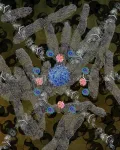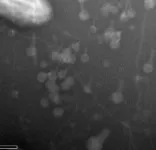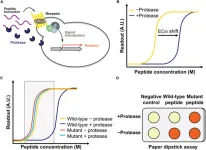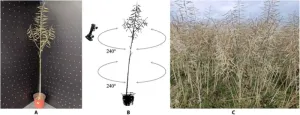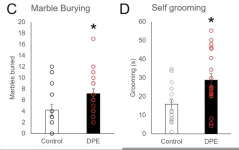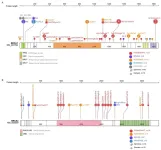(Press-News.org) Typically T cells of the immune system respond to a specific feature (antigen) of a microbe, thereby generating protective immunity. As reported in the journal Immunity, an international team of scientists have discovered an exception to this rule. Namely, a group of divergent bacterial pathogens, including pneumococci, all share a small highly conserved protein sequence, which is both presented and recognized by human T cells in a conserved population-wide manner.
The study set out to understand immune mechanisms that protect against pneumococcus, a bacterial pathobiont that can reside harmlessly in the upper respiratory mucosae but can also cause infectious disease, especially in infants and older adults, which can range from middle ear and sinus infections to pneumococcal pneumonia and invasive bloodstream infections.
Most currently used pneumococcal polysaccharide-based conjugate vaccines (PCVs) are effective against 10–13 serotypes, but growing serotype replacement becomes a problem.
WHO estimates that 1.6 million people die of pneumococcal disease every year, including 0.7–1 million children aged under 5, most of whom live in developing countries.
The Monash Biomedicine Discovery Institute-co-led study, in collaboration with the National Institute for Public Health and the Environment (RIVM) and Utrecht University in the Netherlands and Cardiff University in the UK, identified a crucial fragment of the pneumococcal toxin pneumolysin that was commonly presented by a particular class of human antigen presenting molecules and recognized by T cells from most people who naturally develop specific immunity to pneumococcal proteins.
The study further found that the uniformly presented and broadly recognized bacterial protein fragment was not unique for the pneumococcal pneumolysin but was shared by a large family of bacterial so-called cholesterol dependent cytolysins (CDCs). These are produced by divergent bacterial pathogens mostly affecting humans and cause a range of respiratory, gastro-intestinal, or vaginal infectious diseases.
First author Dr Lisa Ciacchi said “The use of the National synchrotron was key to provide molecular insight into how the T cell receptors see these conserved antigens when presented by common Human Leukocyte Antigen (HLA) molecules”.
Shared first author Dr Martijn van de Garde said “We have not yet identified the exact function of the near-ubiquitous T cell populations to this commonly presented conserved protein fragment during ongoing colonizations or infections with CDC producing bacteria. Whether the T cells have a cross-protective mode of action or have an anti-inflammatory tolerizing function, remains to be investigated”.
Shared first author Dr Kristin Ladell said “The identification of T cells that recognize a ubiquitous bacterial motif using T cell receptors that are shared between individuals with prevalent HLAs is very exciting. Reagents generated for this study can now be used to study patient groups to examine how prevalent these shared TCRs are and how they are related to immune protection”.
Continuing investigations could instruct the development of interventions for people to more efficiently resist or clear CDC-related bacterial diseases.
Read the full Immunity paper: CD4+ T cell-mediated recognition of a conserved cholesterol-dependent cytolysin epitope generates broad antibacterial immunity
DOI: 10.1016/j.immuni.2023.03.020
About the Monash Biomedicine Discovery Institute
Committed to making the discoveries that will relieve the future burden of disease, the Monash Biomedicine Discovery Institute (BDI) at Monash University brings together more than 120 internationally-renowned research teams. Spanning seven discovery programs across Cancer, Cardiovascular Disease, Development and Stem Cells, Infection, Immunity, Metabolism, Diabetes and Obesity, and Neuroscience, Monash BDI is one of the largest biomedical research institutes in Australia. Our researchers are supported by world-class technology and infrastructure, and partner with industry, clinicians and researchers internationally to enhance lives through discovery.
END
Near-universal T cell immunity towards a broad range of bacteria
2023-04-25
ELSE PRESS RELEASES FROM THIS DATE:
Novel living yeast-based dual biosensor for detecting peptide variants
2023-04-25
Biosensors—sensors that can detect biological samples—are powerful tools for understanding the function, composition, and structure of biochemical molecules. Biosensors are often applied for the detection of proteins and their subunits, called peptides, yielding a wide range of biomedical applications. In 2017, researchers from Columbia University in USA engineered a living yeast biosensor by rewiring pheromone-related signaling pathways used by yeast for mating. In the presence of the pheromone peptide, the G-protein coupled receptor (GPCR) could detect the peptide, triggering a cascade that would eventually activate a ...
Sizing them up! An algorithm to accurately quantify rapeseed silique morphology
2023-04-25
Rapeseed or oilseed rape (Brassica napus L.) is an important crop cultivated worldwide for its oil-rich seeds. The rapeseed silique is an organ that plays a role in photosynthesis, sends developmental signals to maturing seeds, and provides a capsule that harbors the seeds. High-yield rapeseed varieties have both a high number and optimal morphology–the form and structure–of siliques. In this regard, rapeseed genotype and cultivation method directly influence the number of siliques that a plant produces. Thus, accurately quantifying silique development parameters is critical for predicting ...
Columbia University launches Center for Precision Psychiatry & Mental Health with $75 million grant from the Stavros Niarchos Foundation
2023-04-25
NEW YORK, April 24, 2023—Columbia University today announced the establishment of the Stavros Niarchos Foundation (SNF) Center for Precision Psychiatry & Mental Health at Columbia University. The center will catalyze the scientific innovation and clinical implementation of precision medicine to advance the prevention, diagnosis, and treatment of mental illness. The center is being established with a $75 million grant from the Stavros Niarchos Foundation (SNF), an international philanthropic organization, as part of SNF’s Global Health Initiative (GHI).
The SNF Center is a joint effort of the Department of Psychiatry at Columbia University Vagelos College of Physicians ...
Research links common insecticide to neurodevelopmental disorders
2023-04-25
A new study from The University of Toledo suggests early exposure to a common class of insecticides called pyrethroids may increase the risk of autism and other developmental disorders, even at levels currently recognized as safe by federal regulators.
The findings, which come from a study of mice, were published today in the peer-reviewed journal PNAS Nexus.
Pyrethroids are some of the most widely used insecticides in the country, appearing in both consumer products and industrial preparations.
“If ...
New research sheds light on how to choose quality eHealth tools
2023-04-25
With so many eHealth tools available, it can be challenging to select the best one for a specific health need. A recent study published in JMIR Human Factors provides valuable insights on how to choose quality eHealth tools in an evolving landscape of digital health technology. This study titled “Assessing the Quality and Impact of eHealth Tools: Systematic Literature Review and Narrative Synthesis” comprehensively examined how the quality and impact of eHealth tools are currently assessed.
Led by Dr Christine Jacob, a health tech researcher at the University of Applied Sciences and Arts Northwestern ...
SwRI tests automated vehicles in virtual off-road environments
2023-04-25
SAN ANTONIO – April 25, 2023 – Southwest Research Institute (SwRI) has created a 3D simulation tool to test automated vehicles in virtual off-road environments modeled after real-world conditions. The research expands SwRI’s investment into software-in-the-loop solutions to test connected and automated vehicles (CAVs) in scenarios ranging from congested roadways to off-road terrain. A simulated environment, or a 3D “software loop,” supports evaluations of an infinite number of scenarios that would be cost-prohibitive to test in the real world.
The technology meets U.S. Department of Defense demands ...
Pesticides and neurodevelopment disorders
2023-04-25
A study of 72 mice mothers and their litters suggests a popular pesticide may cause neurodevelopmental disorders in humans. Previous studies have shown that nearly half of the risk for neurodevelopment disorders, including autism, is environmental, but few specific environmental causes have been clearly identified. James Burkett and colleagues exposed mice to low doses of pyrethroid pesticide deltamethrin during pregnancy and lactation. Pups of exposed mothers vocalized less compared to pups of unexposed mothers. ...
HRD detection predicts sensitivity to platinum-based chemotherapy for ovarian cancer patients in China - BGI Insight
2023-04-25
Homologous Recombination Deficiency (HRD) is a biomarker that predicts ovarian cancer treatment with PARP inhibitors or breast cancer treatment with first-line platinum-based chemotherapy. However, limited research is documented on platinum-based treatment prediction with HRD as a biomarker in ovarian cancer patients, especially in the Chinese population.
This first-ever China prospective cohort study, jointly conducted by BGI Genomics clinical researcher Dr. Shao Di and the Fudan University Shanghai Cancer Center team and published on the Journal of Ovarian ...
NIAID appoints Ted Pierson as new Vaccine Research Center director
2023-04-25
“Ted brings a wealth of knowledge and expertise in virology and human immune responses to viruses. He has played a key role in developing antiviral vaccines and furthering our understanding of important viruses transmitted by mosquitoes and ticks—arboviruses—and how neutralizing antibodies work against flaviviruses, such as Zika virus,” said Acting NIAID Director Hugh Auchincloss, M.D. “He is exceptionally well-suited to lead the VRC and its continued pursuit of innovative basic, translational and clinical discovery.”
Prior to his VRC appointment, Dr. Pierson served as a senior investigator and chief of NIAID’s Laboratory of ...
Ten grants totalling $1 million awarded to support the future of clinical stroke research
2023-04-25
Brain Canada, Heart & Stroke, and the Canadian Stroke Consortium are thrilled to announce the recipients of the 2022 Stroke Clinical Research Catalyst Grants. The purpose of this program is to increase capacity for clinical stroke research within Canada, with an aim to reduce the burden of stroke, prevent recurrence, and improve patient outcomes through clinical research that will improve our understanding of stroke and advance stroke care.
“We are thrilled to be collaborating with two leading organizations ...
